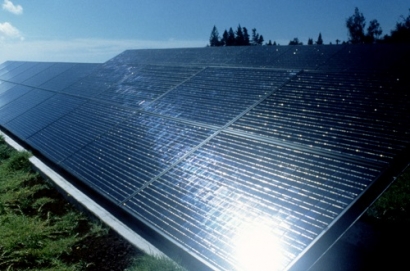
The move is the first major tariff decision Trump has made unilaterally in office. It could prove to be a significant blow for the nation's $2 billion solar industry, which gets around 80 percent of its solar panel products from imports.
The regime announced Monday imposes a 30 percent tariff on imported modules and cells in the first year, and the rate scales down from there -- to 25 percent in the second year, 20 percent in the third year, and 15 percent in the fourth year.
In each year, he first 2.5 GW of imported solar cells will be exempted from the tariff.
"The president's action makes clear again that the Trump administration will always defend American workers, farmers, ranchers and businesses," said Robert Lighthizer, the United States trade representative.
The United States has previously imposed a series of restrictions on cheap solar products from China, but Lighthizer said Chinese companies have responded by simply moving production to other countries and continuing to flood the market.
The tariffs were requested by Suniva, a Georgia-based subsidiary of a Chinese company, which declared bankruptcy last April, and SolarWorld USA, , the U.S. subsidiary of a German company.
Both companies say they've been decimated by a surge in cheap imports and sought tariffs of 50 percent on imported panels last year.
The four members of the U.S. International Trade Commission – two Republicans and two Democrats – unanimously ruled in October that imported panels are hurting American manufacturers, although they differed on exactly how the U.S. should respond.
In a statement, the Solar Energy Industries Association, the national trade association for the solar industry in the U.S., said the decision will likely cause the loss " of roughly 23,000 American jobs this year, including many in manufacturing, and it will result in the delay or cancellation of billions of dollars in solar investments."
“While tariffs in this case will not create adequate cell or module manufacturing to meet U.S. demand, or keep foreign-owned Suniva and SolarWorld afloat, they will create a crisis in a part of our economy that has been thriving, which will ultimately cost tens of thousands of hard-working, blue-collar Americans their jobs,” said Abigail Ross Hopper, SEIA’s President and CEO.
The impact of the decision will be far-reaching across all sectors of the solar economy, SEIA members said.
“It boggles my mind that this president - any president, really - would voluntarily choose to damage one of the fastest-growing segments of our economy,” said Tony Clifford, chief development officer, Standard Solar. “This decision is misguided and denies the reality that bankrupt foreign companies will be the beneficiaries of an American taxpayer bailout.”
Bill Vietas, president of RBI Solar in Cincinnati, said "there’s no doubt this decision will hurt U.S. manufacturing, not help it.”
“The U.S. solar manufacturing sector has been growing as our industry has surged over the past five years. Government tariffs will increase the cost of solar and depress demand, which will reduce the orders we’re getting and cost manufacturing workers their jobs,” Vietas said.
The dispute of solar panels is likely to eventually be settled by the Switzerland-based World Trade Organization, where China and other countries are nearly certain to challenge the tariffs as a violation of international law.

